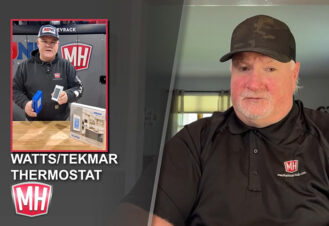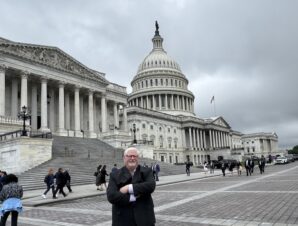Washington, D.C. —Plumbing Manufacturers International (PMI) voiced its opposition to today’s increase of List 3 tariffs on Chinese goods to 25 percent. PMI and its members also reiterated the need for congressional action in support of EPA WaterSense program funding, the United States-Mexico-Canada Agreement (USMCA), and investments in America’s infrastructure as the trade association concluded its Washington, D.C., Legislative Forum and Fly-In held earlier this week. PMI will continue its governmental advocacy efforts next week at the May 13-14 Sacramento (Calif.) Legislative Forum and Fly-In.
“The plumbing products manufacturing industry delivers for the American economy, contributing $85.5 billion in economic impact and more than 464,000 jobs. With so many young Americans making their first home-buying decisions, and the aging stock of homes ripe for remodeling and renovation, the administration’s increased tariffs only serve to push up housing prices and keep more families from achieving the American dream of home ownership,” said Kerry Stackpole, PMI CEO/executive director. “Couple that with increased costs for outfitting commercial, government and industrial construction projects brought on by 25 percent tariff rates, and it becomes clear these additional costs spell trouble for jobs and the economy.”
List 3 tariffs increase will harm the U.S. economy and worker
PMI is one of 150 organizations participating in the Tariffs Hurt the Heartland coalition, which has quantified the harm the tariffs are having on the U.S. economy. Stackpole said the tariffs have caused supply chain disruption, a hold on jobs growth, and higher costs within the plumbing manufacturing industry and related industries. A report from Trade Partnership Worldwide estimates that this latest increase to 25 percent will cost America nearly one million jobs. See PMI’s Tariffs issue brief.
EPA WaterSense program funding
With President Donald Trump’s fiscal year 2020 budget recommending the elimination of the WaterSense program, PMI is asking congressional appropriations committees to provide instructions to the EPA to not cut the program, which has saved Americans 3 trillion gallons of water and billions of dollars in water and energy expenses over the past decade on only a $3 million annual budget. See PMI’s WaterSense issue brief.
PMI member companies have been leaders in developing water-saving technologies promoted by the WaterSense program, Stackpole said. WaterSense awards its certification label to products that are 20 percent more water-efficient than products meeting the minimum federal efficiency standard and performing as well as or better than standard models. Nearly 28,000 water-efficient products carry the WaterSense label.
USMCA will promote economic and job growth
PMI strongly urges U.S. ratification of the USMCA, Stackpole said, with the continued success of U.S. manufacturing depending on North American partnerships. “Ratifying the USMCA will help plumbing manufacturers grow in the United States, compete globally, and support thousands of well-paying manufacturing jobs across the country,” he said. The North American commercial market is one of the most important markets for manufacturers in the United States. Canada and Mexico alone purchase one-fifth of the total value of U.S. manufacturing output. See PMI’s USMCA issue brief.
Infrastructural investment urgently needed
The American Society of Civil Engineers (ASCE) Infrastructure Report Card gives a D+ grade to the national infrastructure. Therefore, PMI encourages leaders in Washington to work in a bipartisan manner to increase investments in federal infrastructure programs, such as the Transportation Infrastructure Finance and Innovation Act (TIFIA), Clean Water State Revolving Fund, Drinking Water State Revolving Fund, and Water Infrastructure Finance & Innovation Act (WIFIA). See PMI’s Infrastructure Issue Brief.
PMI also calls for the issuance of tax-exempt bonds (similar to Move America Bonds or Build America Bonds) that provide state and local governments and private-sector purchasers with tax credits to attract non-federal investment in public infrastructure, as well as the establishment of a National Infrastructure Bank that would offer long-term, low-interest loans to finance projects that are larger than $100 million, achieve goals of regional or national importance, provide a clear public benefit, and are backed by an identified revenue stream that repays the loan.



